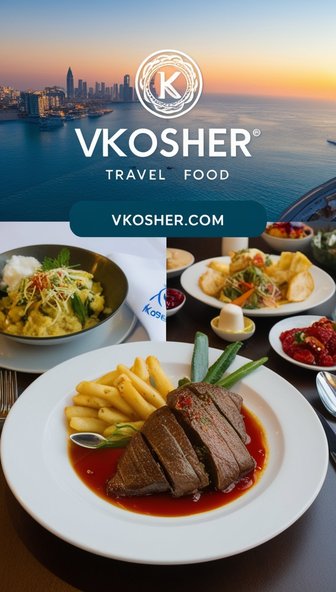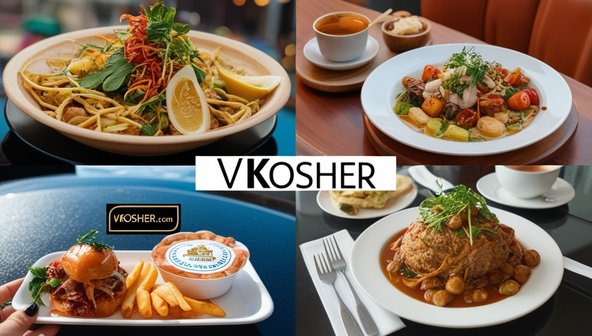Understanding Romanian Kosher Cuisine
Romanian kosher cuisine is a unique and fascinating aspect of Jewish culinary traditions, reflecting the rich history and cultural amalgamation of Romanian Jews. This distinct culinary tradition is characterized by its adherence to Jewish dietary laws, known as kashrut, combined with the flavors, ingredients, and cooking methods indigenous to Romania. The result is a diverse and flavorful array of dishes that have been passed down through generations, each telling a story of survival, adaptation, and identity.
Historical Context of Romanian Kosher Cuisine
The Jewish community in Romania has a long and complex history, dating back to the Roman Empire. Over centuries, Jews in Romania have faced periods of prosperity and hardship, including discrimination and persecution. Despite these challenges, the Jewish community has managed to preserve its cultural and religious traditions, including its culinary heritage.
Romanian kosher cuisine evolved as a way to maintain Jewish dietary laws in the context of the local environment. The cuisine is a reflection of the blend between traditional Jewish foods and the influences of Romanian, Ottoman, and Hungarian cuisines, among others. This blending has resulted in a unique culinary tradition that is both distinctly Jewish and Romanian.
Key Ingredients and Flavors
The ingredients used in Romanian kosher cuisine are heavily influenced by the agricultural landscape of Romania. The fertile soil and temperate climate allow for the cultivation of a wide variety of vegetables, grains, and fruits, which are staples in the diet. Additionally, Romania's geographical location has made it a crossroads for various trade routes, bringing in spices and ingredients from different parts of the world.
In Romanian kosher cuisine, vegetables like cabbage, potatoes, and root vegetables play a significant role. Meat, particularly beef and poultry, is prepared according to kosher laws, which involve specific methods of slaughtering and processing to ensure the meat is fit for consumption. The use of garlic, onions, dill, and paprika is common, adding depth and flavor to the dishes.
Traditional Romanian Kosher Dishes
One of the most iconic dishes in Romanian kosher cuisine is mamăligă, a traditional cornmeal dish similar to polenta. It is often served as a side dish or as a base for other dishes. Sarmale, cabbage rolls stuffed with ground meat and rice, is another popular dish, embodying the fusion of Romanian and Jewish culinary traditions. These cabbage rolls are typically slow-cooked in a tomato-based sauce, giving them a rich and savory flavor.
Cholent, a slow-cooked stew made with beans, barley, and meat, is a staple in Jewish households, particularly for the Sabbath. In Romania, cholent often includes local ingredients such as smoked meats and sausages, adding a distinct Romanian flavor to the dish.
Gefilte fish, a dish made from ground fish mixed with onions, eggs, and matzo meal, is another important part of Romanian kosher cuisine. This dish is traditionally served during Jewish holidays such as Passover. The Romanian version often includes a sweet and sour sauce, made with carrots and sugar, giving it a unique flavor profile.
The Role of Kosher Wine
Wine plays a significant role in Jewish rituals and celebrations, and Romanian kosher wine has a storied history. Romania's climate and terrain are conducive to viticulture, and Jewish communities have been producing kosher wine for centuries. Kosher wine from Romania is made following strict kashrut guidelines, ensuring it meets the religious standards required for use in Jewish ceremonies.
Romanian kosher wines are typically made from indigenous grape varieties, producing wines with distinctive flavors and characteristics. These wines are enjoyed not only during religious ceremonies but also as an accompaniment to traditional Romanian kosher meals.
The Influence of Romanian Kosher Cuisine on Global Jewish Food
Romanian kosher cuisine has had a significant impact on Jewish food around the world, particularly in countries where Romanian Jews emigrated. The waves of Jewish immigration from Romania in the late 19th and early 20th centuries brought these culinary traditions to new countries, where they were adapted to local ingredients and tastes.
In Israel, for example, Romanian kosher dishes have become a part of the broader Israeli culinary landscape. In the United States, particularly in New York and other cities with large Jewish populations, Romanian kosher food can be found in delis and kosher restaurants. These establishments often serve traditional Romanian dishes alongside other Jewish and Eastern European foods, creating a diverse and rich culinary experience.
Romanian Kosher Cuisine Today
Today, Romanian kosher cuisine continues to thrive, both in Romania and in Jewish communities around the world. In Romania, kosher food can be found in synagogues, Jewish community centers, and kosher restaurants, serving as a reminder of the rich Jewish heritage in the country.
The Romanian Jewish community, though smaller than in the past, remains vibrant, and efforts are being made to preserve and promote their culinary traditions. Kosher food festivals, cooking classes, and cultural events are some of the ways in which Romanian kosher cuisine is being kept alive and passed on to future generations.
In the diaspora, Romanian kosher food continues to be a beloved part of Jewish cuisine. Whether it is the comforting taste of cholent, the tangy flavor of gefilte fish, or the hearty satisfaction of sarmale, these dishes continue to be cherished by those who grew up with them and by new generations discovering them for the first time.
The Future of Romanian Kosher Cuisine
As with many traditional cuisines, Romanian kosher cuisine is evolving. While the core principles of kashrut remain unchanged, there is a growing interest in adapting traditional recipes to modern tastes and dietary preferences. This includes the use of organic and locally sourced ingredients, as well as the incorporation of contemporary cooking techniques.
Moreover, the rise of the global food movement has led to increased interest in regional and traditional foods. Romanian kosher cuisine, with its rich history and unique flavors, is gaining attention from food enthusiasts and culinary historians alike. This renewed interest is helping to preserve and revitalize this important culinary tradition.
Conclusion
Romanian kosher cuisine is a testament to the resilience and adaptability of the Jewish community in Romania. It reflects a history of survival, cultural exchange, and religious devotion, all while offering a delicious and diverse array of dishes. As this culinary tradition continues to evolve, it remains a vital part of the Jewish cultural heritage, both in Romania and in the global Jewish diaspora.
By exploring and celebrating Romanian kosher cuisine, we not only honor the past but also ensure that these flavors and traditions will continue to be enjoyed by future generations. The story of Romanian kosher food is one of connection—between people, cultures, and history—and it is a story that deserves to be told and savored.




